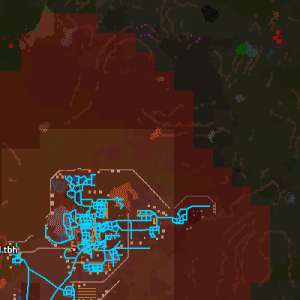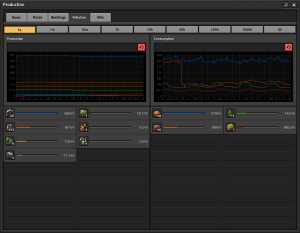User:Henk Zaan/Pollution/nl: Difference between revisions
Partley translated article |
|||
| Line 23: | Line 23: | ||
* [[Tree/nl|Bomen]] absorberen ook enige vervuiling (Zie [[Pollution#Trees/nl|Bomen]]). | * [[Tree/nl|Bomen]] absorberen ook enige vervuiling (Zie [[Pollution#Trees/nl|Bomen]]). | ||
* [[Enemies#Spawner/nl| | * [[Enemies#Spawner/nl|Broedplaatsen]] absorberen een grote hoeveelheid vervuiling en gebruiken deze om aanvallen toe te wijzen aan de vijand. | ||
== | == Inheems leven == | ||
Vervuiling trekt | |||
[[Enemies#Biters/nl|bijters]] naar de fabriek van de speler. Bijters die in een vervuild gebied terechtkomen, zullen proberen de bron van vervuiling te bereiken en te vernietigen. | |||
Als de vervuiling van een brok groter is dan 20, absorbeert elke vijandelijke broednest elke seconde 20 + 0,01 * [stuk vervuiling], anders absorbeert het 3 keer de hoeveelheid vervuiling die nodig is voor de duurste eenheid die het kan voortbrengen voor de stroom evolutie factor. | |||
Higher pollution values decrease the time it takes for biters to join the attack force. After a certain amount of pollution is absorbed the spawner sends one of its biters/spitters to a rendezvous point. Every 1 to 10 minutes (random) the mustered biters launch an attack. If not all biters have arrived at the rendezvous point by that time, they will wait up to an additional 2 minutes for stragglers. | Higher pollution values decrease the time it takes for biters to join the attack force. After a certain amount of pollution is absorbed the spawner sends one of its biters/spitters to a rendezvous point. Every 1 to 10 minutes (random) the mustered biters launch an attack. If not all biters have arrived at the rendezvous point by that time, they will wait up to an additional 2 minutes for stragglers. | ||
Revision as of 07:24, 6 June 2020


Vervuiling wordt gepresenteerd als een abstracte "wolk". Dit wordt elke spelseconde (60 tikken) en zichtbaar gemaakt op de plattegrond wanneer "alt-view" aan is (default Alt-Key). Het wordt zichtbaar als een rood gekleurde vierkante wolk.
Vervuiling wordt door vele verschillende gebouwen geproduceerd en het verspreidt zich met een constante snelheid.
De evolutie factor wordt niet verhoogd bij het verspreiden of geabsorbeerd vervuiling, maar alle geproduceerde vervuiling van alle spelers bij elke tik. Dit betekend dat ondanks alle moeite van de speler om de vervuiling te verminderen, vijanden evolueren met dezelfde snelheid. Zij zullen de speler niet vaker aanvallen. De vervuilingswolk is er om de biter aanvallen te activeren en de grote van de aanval te bepalen.
Vervuilingsinstellingen kunnen aangepast worden via map generatie instellingen, of kunnen helemaal uitgezet worden.
Verspreiding vervuiling
Zodra een brok 15.0 vervuiling heeft bereikt, begint het in alle richtingen te verspreiden met een snelheid van 2% per spel-seconde (60 tikken). Vervuiling genereerde nieuwe brokken om de vervuiling te verspreiden.
Bijvoorbeeld: a brok met 400.0 vervuiling en 4 aangrenzende brokken met elk 100.0 vervuiling, verhoogt de vervuiling in alle aangrenzende brokken met 8.0 terwijl zijn eigen vervuiling verminderd met 32.0. Maar elke aangrenzende blok verspreid 2.0 vervuiling terug naar de centrale brok, zodoende verliest het slechts 24.0 + absorbed value.
Verontreiniging
- Elk stuk (32x32) van de kaart vermindert langzaam de vervuiling die het bedekt (Zie stuk). Dus hoe meer de vervuiling zich verspreidt, hoe meer er wordt opgenomen.
- Broedplaatsen absorberen een grote hoeveelheid vervuiling en gebruiken deze om aanvallen toe te wijzen aan de vijand.
Inheems leven
Vervuiling trekt bijters naar de fabriek van de speler. Bijters die in een vervuild gebied terechtkomen, zullen proberen de bron van vervuiling te bereiken en te vernietigen.
Als de vervuiling van een brok groter is dan 20, absorbeert elke vijandelijke broednest elke seconde 20 + 0,01 * [stuk vervuiling], anders absorbeert het 3 keer de hoeveelheid vervuiling die nodig is voor de duurste eenheid die het kan voortbrengen voor de stroom evolutie factor.
Higher pollution values decrease the time it takes for biters to join the attack force. After a certain amount of pollution is absorbed the spawner sends one of its biters/spitters to a rendezvous point. Every 1 to 10 minutes (random) the mustered biters launch an attack. If not all biters have arrived at the rendezvous point by that time, they will wait up to an additional 2 minutes for stragglers.
Required pollution to add an additional biter/spitter to the attack wave:
| Pollution | Type |
|---|---|
| 4 | Small biter |
| 20 | Medium biter |
| 80 | Big biter |
| 400 | Behemoth biter |
| 4 | Small spitter |
| 12 | Medium spitter |
| 30 | Big spitter |
| 200 | Behemoth spitter |
Modules
Modules that list "+x% pollution" increase pollution multiplier, not a flat pollution rate. Final pollution value is (pollution multiplier * energy usage multiplier * base pollution), meaning heavily boosted buildings are likely to account for most of the pollution produced in a factory.
Production/Absorption
These tables contain information about the levels of pollution produced/absorbed by items in the game.
Polluters
| Structure | Pollution per minute at full power |
|---|---|
| Stenen oven | 2 |
| Stalen oven | 4 |
| Elektrische oven | 1 |
| Verbrandingsmijnboor | 12 |
| Elektrische mijnboor | 10 |
| Jaknikker | 10 |
| Montagemachine 1 | 4 |
| Montagemachine 2 | 3 |
| Montagemachine 3 | 2 |
| Ketel | 30 |
| Olieraffinaderij | 6 |
| Chemicaliënfabriek | 4 |
| Centrifuge | 4 |
Fire on the ground and burning trees produce 0.005 pollution per second.
De-polluters
Spawner
If a chunk's pollution is greater than 20, each enemy spawner absorbs 20 + 0.01 * [chunk's pollution] every game second (60 ticks), otherwise it absorbs 3 times the amount of pollution needed for the most expensive unit it can spawn for the current evolution factor.
Chunks
Every chunk has a natural absorption rate per second which is determined by the sum of the pollution absorption of its floor tiles.
Following numbers are the pollution reduction for a single tile per second.
| Tile | Pollution per second |
|---|---|
| Grass 1-4 | -0.0000075 |
| Dirt 1-7, dry dirt | -0.0000066 |
| Sand 1-3 | -0.0000058 |
| Red desert 0-3 | -0.0000066 |
| Water, green water, deep water, deep green water, shallow water, mud water | -0.000005 |
| Path tiles (Stone bricks, concrete etc), landfill | 0 |
| Out of map | -0.00001 |
| Special tiles (Lab tiles, tutorial grid) | 0 |
Trees
Every single tree absorbs a small amount of pollution in its chunk per second. If the total pollution in a chunk is above 60 units, once per second some of the trees in that chunk each have a chance to either lose one stage of leaves or have their leaves become one stage more gray. Regardless of whether the tree loses leaves or gets grayer, 10 pollution are absorbed by the tree.
A tree stops losing leaves/becoming more gray once the sum of its gray percentage and its leaves lost percentage is above 120%. As the grayness and leave stage are then locked for that tree forever, it is possible for trees to keep some leaves in heavily polluted chunks but in turn be very gray, or the other way around.
The less dense the leaves, the slower the tree absorbs pollution, however tree grayness does not affect pollution absorption.
Achievements
Pollution is directly connected to the following achievement:

|
It stinks and they don't like it Start een buitenaardse aanval door vervuiling. |
History
- 0.17.12:
- Added pollution tab to the production statistics.
- Spawner tooltip (including the pollution statistics), shows distribution of biters spawn for the current evolution factor with the pollution costs.
- Pollution generation is now shown in the x/s format both on the entity and in the item/crafting slot.
- Internal pollution values have been normalized, and they are now roughly 60 times less compared to what they were.
- 0.17.0:
- Rebalanced assembling machine 1,2 and 3 power consumption and pollution - higher tiers eat more power, but produce less pollution.
- Changed spawner pollution absorption logic so that all the pollution on a chunk doesn't build up un-spent in a single spawner.
- 0.13.2:
- Optimized rendering of huge pollution clouds on the map.
- 0.13.0:
- Large amounts of pollution is created when burning fires.
- Pollution creation of the productivity module was reduced drastically.
- Optimized pollution rendering on map and minimap.
- 0.8.0:
- Added option to turn off pollution visibility even when detailed info is on.
- 0.7.1:
- Speed modules no longer produce extra pollution.
- Added missing pollution descriptions.
- Pollution is only shown on the minimap with alt mode on.
- 0.7.0:
- Introduced concept of pollution.





